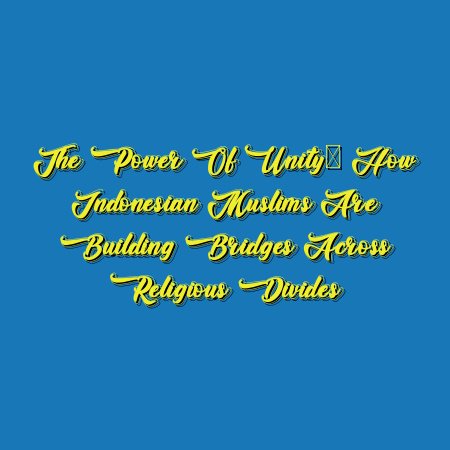Daftar isi
The Power of Unity: How Indonesian Muslims are Building Bridges Across Religious Divides – Hello, Sobat Majikan! Perbedaan agama seringkali menjadi penyebab konflik dan perpecahan di berbagai negara. Namun, di Indonesia, terdapat fenomena yang menarik dan menginspirasi sekaligus, yaitu bagaimana umat Muslim Indonesia membangun jembatan kebersamaan dengan umat dari agama lain. Artikel ini akan mengupas tentang kekuatan persatuan yang dimiliki oleh umat Muslim Indonesia dalam membangun kerjasama dan menjalin hubungan yang baik dengan umat dari berbagai agama. Mari kita simak dan baca Artikel ini hingga selesai untuk mengetahui lebih lanjut mengenai fenomena yang membanggakan ini.
The Power of Unity: How Indonesian Muslims are Building Bridges Across Religious Divides
Indonesia, with its population of over 270 million people, is the largest Muslim-majority country in the world. It is a nation that prides itself on its diverse and pluralistic society, where people of different religions coexist harmoniously. Despite occasional tensions, Indonesian Muslims have been actively working towards building bridges across religious divides, emphasizing the power of unity in fostering peace, understanding, and social cohesion.
The Importance of Interfaith Dialogue
Interfaith dialogue plays a crucial role in bridging gaps between different religious communities in Indonesia. It has become a platform for open and respectful discussions, promoting understanding, empathy, and cooperation among diverse groups. The Indonesian government, religious organizations, and civil society groups have been actively involved in organizing interfaith dialogues at both national and local levels.
One notable example is the “Indonesia’s Harmony Forum,” a platform established in 2003 to facilitate dialogue between religious leaders from various faiths. The forum brings together representatives from Islam, Christianity, Hinduism, Buddhism, and Confucianism to engage in constructive conversations, address common challenges, and promote mutual respect.
Education for Tolerance and Understanding
Education is a powerful tool for fostering tolerance and understanding among Indonesian Muslims. Recognizing this, the Indonesian government has implemented initiatives to promote religious harmony and inclusivity in schools and universities. Religious education curricula have been revised to emphasize tolerance, respect, and dialogue between different faiths.
One successful example is the “Schools of Pluralism” program, introduced in 2014. This program aims to integrate religious diversity into the education system by incorporating teachings from different religions, providing students with a comprehensive understanding of different faiths and promoting mutual respect.
Case Study: The Nahdlatul Ulama
The Nahdlatul Ulama (NU) is one of the largest Islamic organizations in Indonesia, with approximately 60 million members. It has played a significant role in promoting interfaith dialogue and countering religious extremism. NU believes in the power of unity and actively works towards building bridges across religious divides.
NU’s approach to bridging religious divides is multifaceted. They organize interfaith dialogues, seminars, and workshops to promote understanding and cooperation among different religious communities. NU also actively engages in social service activities, such as providing healthcare, education, and disaster relief, regardless of religious affiliation.
One inspiring example is NU’s response to the devastating earthquake that struck Lombok in 2023. They set up emergency shelters, provided medical aid, and distributed food and supplies to affected communities, regardless of their religious background. This act of solidarity and compassion showcased the power of unity in times of crisis.
Challenges and the Way Forward
While significant progress has been made in building bridges across religious divides in Indonesia, there are still challenges that need to be addressed. Extremist ideologies, social prejudices, and political polarization pose threats to the country’s pluralistic fabric. To overcome these challenges, it is essential to continue promoting interfaith dialogue, education, and inclusive policies.
Additionally, media plays a crucial role in shaping public opinion and fostering understanding. Responsible journalism that promotes unbiased reporting and avoids sensationalism can contribute to a more inclusive and cohesive society. It is important for the media to highlight stories of unity, cooperation, and interfaith harmony, showcasing the positive efforts being made by Indonesian Muslims.
Summary
Indonesian Muslims are actively working towards building bridges across religious divides, recognizing the power of unity in fostering peace, understanding, and social cohesion. Interfaith dialogue, education for tolerance and understanding, and organizations like the Nahdlatul Ulama play a significant role in promoting interreligious harmony. However, challenges such as extremist ideologies and social prejudices still exist. By continuing to promote dialogue, education, and inclusive policies, Indonesia can further strengthen its diverse and pluralistic society.
Dalam sebuah dunia yang semakin terpecah belah oleh perbedaan agama, Indonesia menjadi contoh nyata tentang kekuatan persatuan. Melalui upaya mereka untuk membangun jembatan antar perbedaan agama, umat Muslim Indonesia telah menunjukkan betapa pentingnya persatuan dalam memperkuat hubungan antar umat beragama. Dengan saling menghormati, memahami, dan menghargai keyakinan satu sama lain, mereka telah menciptakan lingkungan yang harmonis dan damai. Semoga kisah inspiratif ini dapat menjadi pemicu bagi kita semua untuk membangun persaudaraan antar umat beragama, dan sampai jumpa kembali di Artikel menarik lainnya.
#Power #Unity #Indonesian #Muslims #Building #Bridges #Religious #Divides Majikan pulsa The Power of Unity: How Indonesian Muslims are Building Bridges Across Religious Divides
